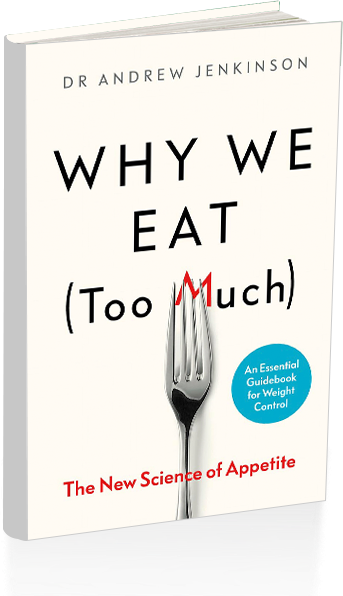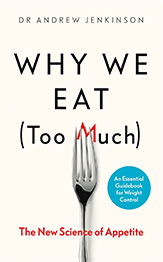Why can some people eat and eat, yet not gain weight, whilst others are constantly dieting and restricting their calories… but failing to lose weight?
These observations don’t seem to fit in with our commonly held belief that weight gain and weight loss can easily be controlled by the amount that we eat. Our mental calculation of calories in (from food) versus calorie out (from exercise) often doesn’t seem to fit when we look at an individual person’s actual experience of weight loss and weight gain.
It can’t be denied that the ultimate calculation in our weight fluctuations is that simple energy in vs energy out equation, so there must be something behind this simple rule that we don’t currently fully understand.
In Why We Eat (Too Much) I introduce the concept of ‘metabolic adaptation’. This basically looks at the Energy Out part of the equation and questions whether we fully understand it.
Doctors know that most of our energy expenditure is due to our resting metabolic rate. This is the amount of energy that we use up by: breathing, our heartbeat, heating our bodies, and the chemical reactions that constantly take place in all our 4 trillion cells. This makes up 70% of our energy expenditure – if we laid in bed all day we would still expend this.
What doctors commonly don’t realise is that our resting metabolism is very dynamic – it can be switched up or down depending on our body’s needs.
So, what happens if you are carrying excess fat that you don’t want… but that your body wants to keep hold of?
Or what happens when you think you are too slim and you want to put weight on… but your body wants to keep you slim?
Well, that overweight dieter will lose some weight initially but over time, usually only days or weeks the body will intervene – metabolism will collapse. Making you feel tired and listless and irritable… and stopping further weight loss. When the scales aren’t budging any more the dieter will come off their program and experience rapid weight-regain – their weight usually settling at a level higher than when the diet was commenced.
The same effect happens when a naturally slim person tries to adjust their weight to a higher level. They will eat and eat, maybe gaining a few measly pounds, but then their body will step in to protect what it perceives is their healthy slim weight. Metabolism increases and weight gain stops. When they give in and eat as their appetite tells them to they will lose their excess weight.
Fascinating historical overeating and starvation studies - the Minnesota Starvation Experiment (of wartime conscientious objectors) and The Vermount Prison Overeating Experiment (of prisoners) – are described in the book. These confirm large swings in metabolic rates depending on whether a human subject is forced into starvation or overeating.
More recent studies have confirmed the differences in resting metabolism between people of the same size, age and sex – these can over 700kcals / day between the top and bottom 10% of metabolisers in a group.
These variations in metabolism are the same as a daily 10k run (for the slim overeater), or a large 3 course meal (for the overweight dieter). It’s not surprising then that there is so much confusion with our current simplistic understanding of human weight loss and weight gain.
In the next blog, I will explain how we are currently trying to measure resting metabolism in the outpatient clinic.


